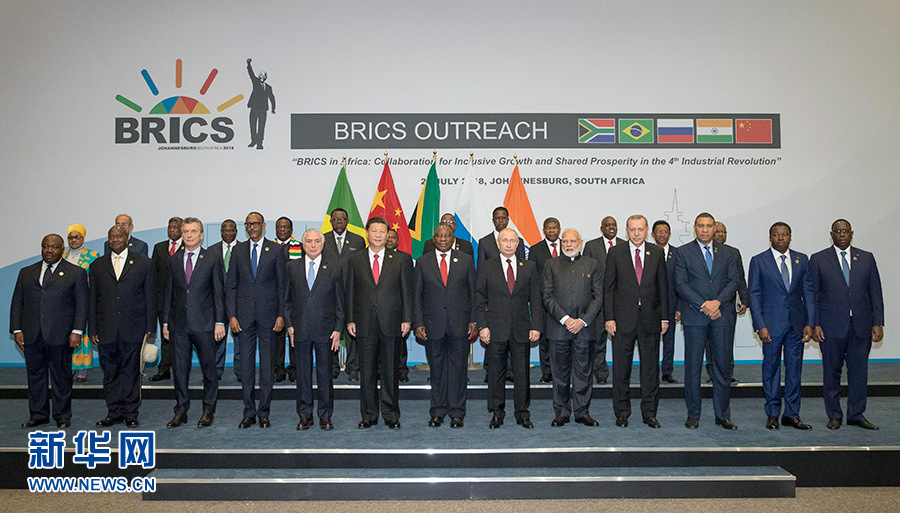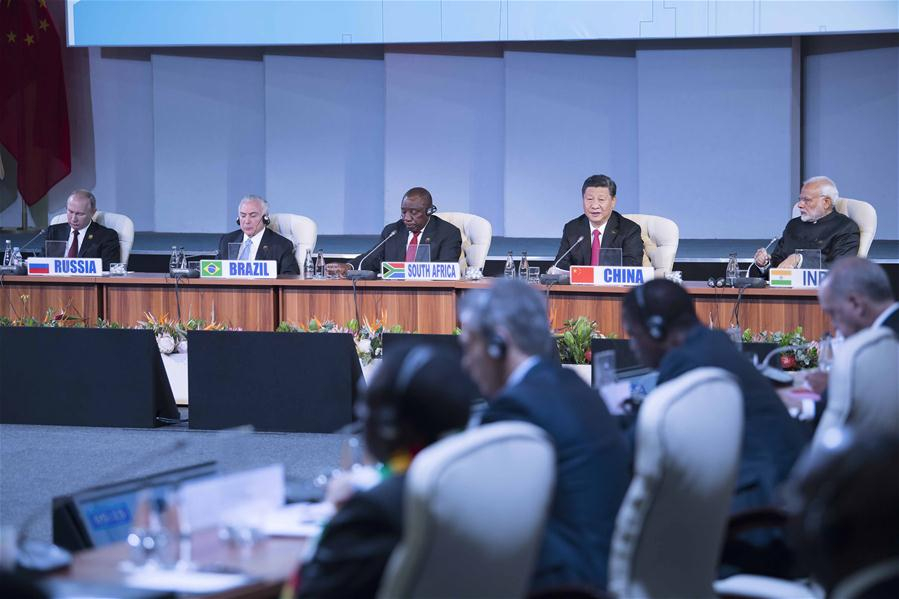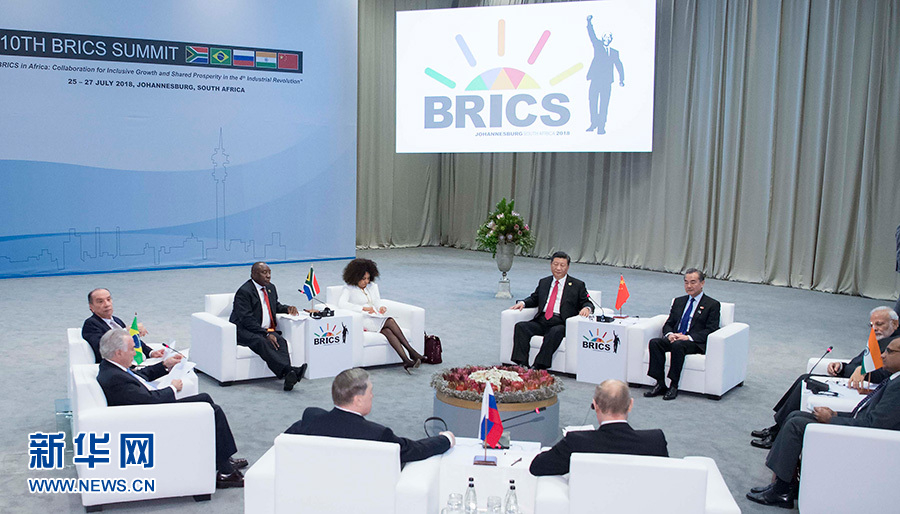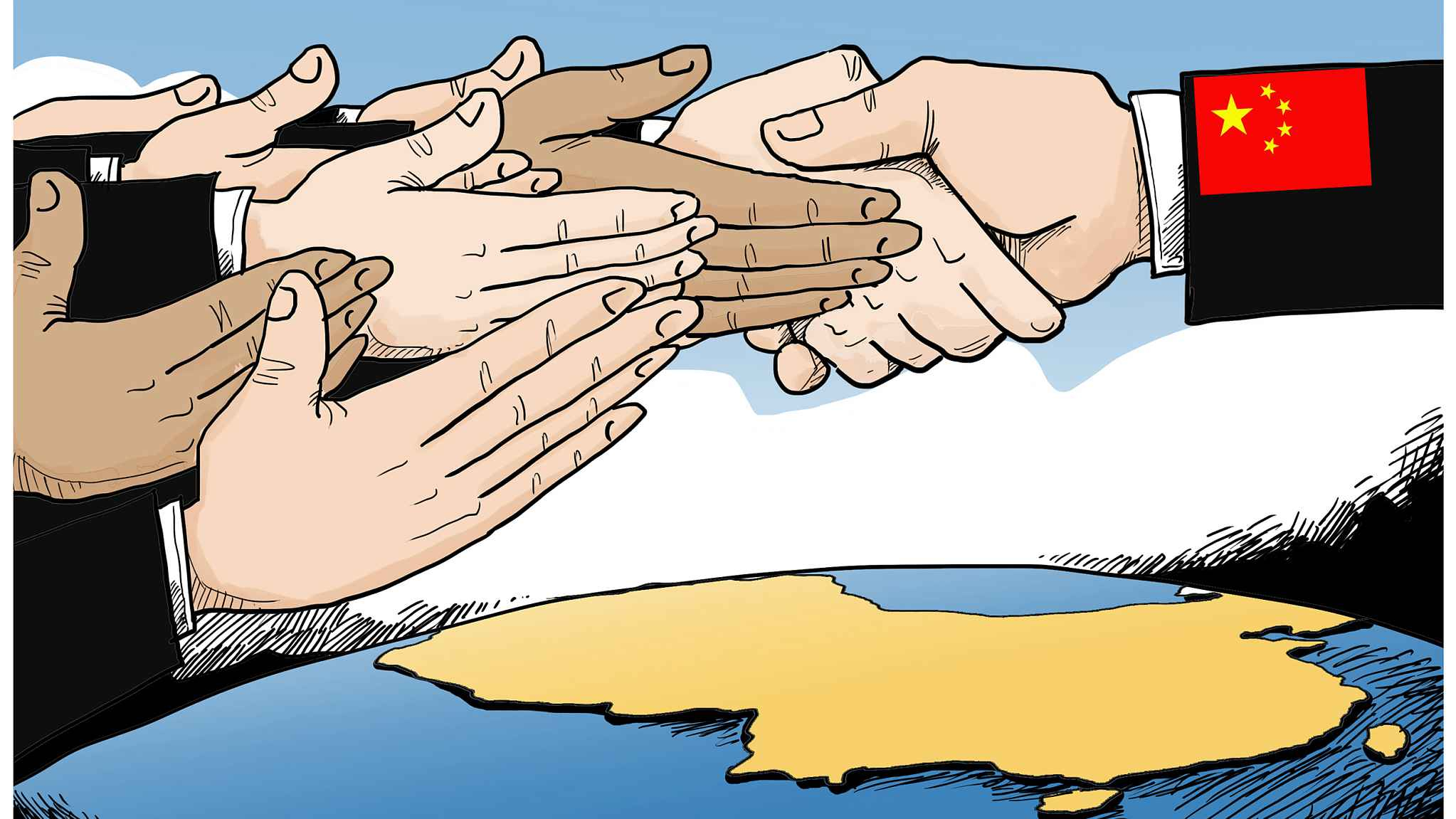Editor's note: Wang Li is a professor at Jilin University in China. The article reflects the author's opinion, and not necessarily the views of CGTN.
Chinese President Xi Jinping started his state visit to Africa on July 21, touring countries including Senegal, Rwanda, and South Africa, where he attended the 10th BRICS summit followed by a friendly visit to Mauritius.
It is Xi’s fourth visit to the continent since he assumed office as Chinese president in 2013.
Diplomatically, Africa has been a cornerstone of China’s foreign policy since the early 1960s.

The BRICS leaders pose for a group photo with leaders or representatives of the leaders from invited countries, and heads of regional organizations in Africa in Johannesburg, South Africa, July 27, 2018. / Xinhua Photo
The BRICS leaders pose for a group photo with leaders or representatives of the leaders from invited countries, and heads of regional organizations in Africa in Johannesburg, South Africa, July 27, 2018. / Xinhua Photo
At that time, Africa became one of the vital components of the international geopolitical system into which Beijing was deeply engaged politically, militarily and economically, as it was crystalized in the aftermath of Premier Zhou Enlai’s safari in Africa.
Since then, it has never been absent from China’s strategic thinking due to the following reasons.
To begin with the obvious, over 50 African states represent a significant proportion of the membership of the United Nations and many other intergovernmental organizations (IGOs). That fact can’t be ignored by any of the great powers, including China.
Now as a rising great power and the most dynamic developing country as well, China is aware of Africa as a strategic arena where it would be able to present its own blueprints for rapid development, a win-win cooperation pattern in international governance, and more pragmatically, the construction of such spectacular infrastructure projects ranging from railroad and highway networks to all kinds of energy and mining initiatives.
President Xi’s visit to Africa aims to accomplish two key tasks: one is to promote the Belt and Road Initiative (BRI), and the other is to construct the community of shared future, both of which are the essential parts of Xi’s ideas on China’s increasing role in the world.

Chinese President Xi Jinping talks at an outreach dialogue grouping leaders from the BRICS, the "BRICS Plus" and African countries at the 10th BRICS summit in Johannesburg, South Africa, July 27, 2018. /Xinhua Photo
Chinese President Xi Jinping talks at an outreach dialogue grouping leaders from the BRICS, the "BRICS Plus" and African countries at the 10th BRICS summit in Johannesburg, South Africa, July 27, 2018. /Xinhua Photo
Yet, economically, of the major world regions, “Africa is not only the most susceptible to external forces but also least able to swiftly adapt to transformations in the world economy and international politics,” as scholar Crawford Young argued.
However, most countries in Africa have supported and are involved in the BRI. For example, after the successful completion of railroads from Addis Abeba-to-Djibouti and from Nairobi-to-Mombasa, the Africans have come to realize the benefits involved.
In effect, Africa’s economic issues are not only a temporary aberration but are long term, which has been further worsened by its debt imbroglio.
In order to enhance African involvement in the global economy, China is ready to deepen cooperation with African states, ranging from improving local production capacities such as processing of agricultural and fishery products to general industrial capacity and human resources development.
In addition, we have good reasons to believe that China has and will continue to seek greater synergy in strategies, by which China is willing to share with African states its experience of governance as well as its successful experience in industrial development, rural vitalization, and poverty alleviation over the past 40 years in its reform and opening-up.

Chinese President Xi Jinping, South African President Cyril Ramaphosa, Brazilian President Michel Temer, Russian President Vladimir Putin and Indian Prime Minister Narendra Modi attend an informal meeting to commemorate the 10th anniversary of the BRICS mechanism in Johannesburg, South Africa, July 27, 2018. /Xinhua Photo
Chinese President Xi Jinping, South African President Cyril Ramaphosa, Brazilian President Michel Temer, Russian President Vladimir Putin and Indian Prime Minister Narendra Modi attend an informal meeting to commemorate the 10th anniversary of the BRICS mechanism in Johannesburg, South Africa, July 27, 2018. /Xinhua Photo
On July 25, President Xi spoke at the BRICS Business Forum at the 10th BRICS Summit, themed "BRICS in Africa: Collaboration for Inclusive Growth and Shared Prosperity in the 4th Industrial Revolution."
He expressed that China has always fostered BRICS-Africa partnerships and assisted African nations to play their part in the global market.
As discussed previously, Africa is – more than any other region – desperately in need of economic assistance on a large scale, since it has been singularly ill-positioned to benefit from the globalization of the world economy that has occurred since the later 20th century.
Yet, due to that, China has been involved in world affairs much more than before. It is necessary for the Chinese government to demonstrate its will, wisdom and capacity “to build a new model of international relations featuring mutually beneficial cooperation, and create a community of shared future for mankind,” as Xi has reiterated.
Accordingly, Africa continues to be a significant arena that necessarily meets China’s overall strategic needs in terms of international cooperation and regional development. The two sides have stepped up communication and coordination with each other over major issues including United Nations affairs, safeguarding the multilateral trading system, climate change and the peaceful development of Africa.





